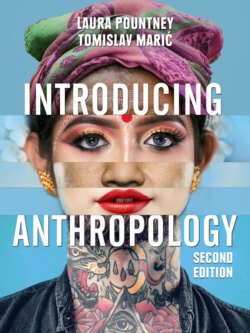Читать книгу Introducing Anthropology - Laura Pountney - Страница 96
Interview with Sarah Pink (2020)
ОглавлениеSarah Pink is Director of the Emerging Technologies Research Lab at Monash University, Australia, and has a joint appointment across the Faculty of Art, Design and Architecture and the Faculty of Information Technology. Her research focuses on emerging intelligent technologies, automation, data, digital futures, safety and design for wellbeing. Here, she explains how digital ethnography is used in her own research.
digital ethnography This is an approach to ethnographic practice that accounts for the relationship between the digital, material and physical elements of human activities, experiences and environments
WHAT IS DIGITAL ETHNOGRAPHY?
Digital ethnography is an approach to ethnographic practice that accounts for the relationship between the digital, material and physical elements of human activities, experiences and environments. A digital ethnographic approach understands the digital, material and physical as being inseparable in the contemporary world.
HOW IS DIGITAL ETHNOGRAPHY DIFFERENT FROM CLASSICAL FIELDWORK?
Digital ethnography acknowledges that the digital layers of life are now inextricable from our everyday worlds and therefore need to be accounted for in ethnographic practice. It therefore moves seamlessly between digital and material environments. It might involve following research participants as they move through material and digital environments or social worlds simultaneously – for example, as a person walks along the street talking with a friend, while at the same time moving through online maps and including another person in the conversation through an app.
HOW DO ANTHROPOLOGICAL THEORIES INFORM YOUR WORK?
My ethnographic practice is informed by three key approaches: attention to sensory perception and experience – those things that we feel in our bodies and emotions that we cannot necessarily put into words; the idea that people and things are always moving (both digitally and materially); and theories of place and emergence whereby I understand human experience and activity to occur in a continually changing and evolving situation that different things and processes move in and out of.
HOW DO YOU CONDUCT FIELDWORK ONLINE? Online fieldwork can be undertaken by participating in a range of online activities. For example, this might be in online forums, in social media and though engagement with participants in other online practices and platforms, always with their permission. My own research brings together online and offline as part of the same context; however, other researchers have usefully developed methods for doing research online.
DO YOU COLLABORATE WITH OTHER DISCIPLINES IN YOUR RESEARCH?
Interdisciplinary research underpins much of my work and this enables me to do research that would have been impossible for me as a lone anthropologist. I have collaborated with researchers from many disciplines, including, engineering, design, arts practice, media studies, cultural studies, art therapy, safety science, organization studies, pedagogy, sociology and geography. I collaborate with researchers based both in universities and in industry. This allows me to develop projects that advance academic theory and methodology, on the one hand, and, on the other, that make a contribution outside academia.
WHAT IS YOUR LATEST WORK?
My current work focuses on the anthropology of emerging technologies – such as new modes of automation and artificial intelligence, and how they are experienced in technologies like self-driving cars and future mobility systems, energy futures and healthcare environments. I want to understand how we can best engage such technologies for the benefit of human futures, and I argue that anthropology has an important role to play in guiding such futures.
WHAT ARE THE ETHICAL ISSUES REGARDING DIGITAL ETHNOGRAPHY?
Ethical issues tend to be specific to different research contexts and questions rather than being particular to digital ethnography per se. My recommendation is to underpin any digital ethnographic research with rigorous and reflexive anthropological ethics that attends to questions of participants’ informed consent, privacy and wellbeing and regards research as a collaborative relationship.
